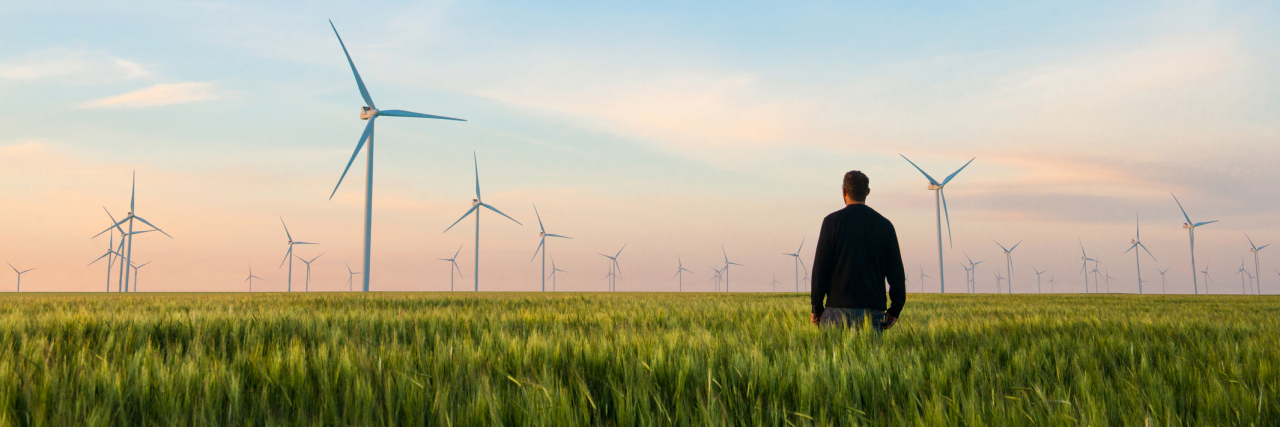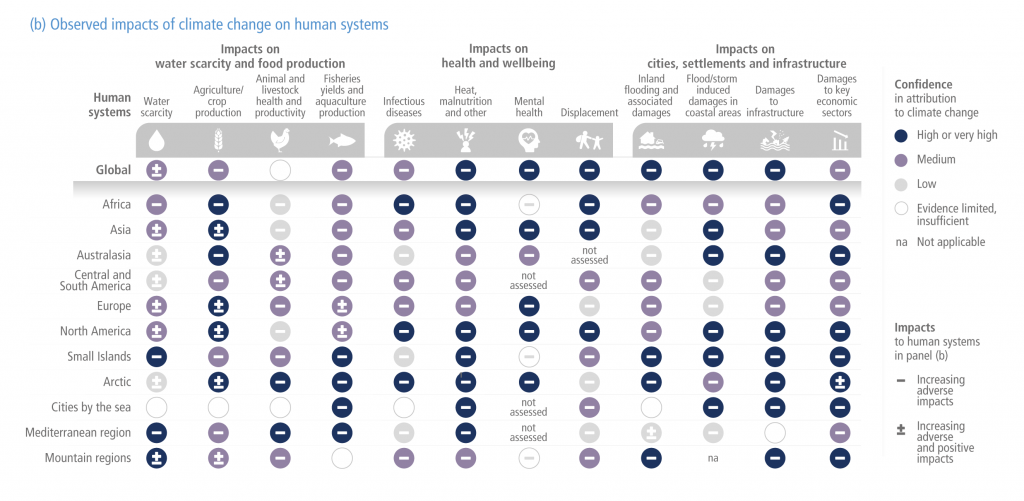Climate Change is Affecting Global Mental Health. Here Is What You Need to Know and What to Do About It.
Editor's Note
The following article contains details about climate change and the environment that may be triggering.
If you experience suicidal thoughts, you can contact the Crisis Text Line by texting “START” to 741741.
I live in a small suburb of Belfast, Northern Ireland, near a busy road that thunders with traffic. On the other side of this road, Belfast Lough teems with passing ships. The beach here is small and dirty; in a nearby copse of trees, discarded beer cans outnumber wildlife.
And yet, recently, I spotted movement in one of the eaves of our roof. Part of it has come away, revealing a tiny hole just small enough and cozy enough for a family of house sparrows to make their nest. I found an egg just below that nest a few days ago; it was empty, stained on the inside from the birth of a tiny life. It was a magical moment, knowing we share our house with a family of living beings. It came at just the right time, too; I’ve been feeling particularly low and scared, lately, by the runaway train our planet is set on while those who could do something to change our course simply watch and count their hoarded wealth.
I’ve been experiencing what has been called “eco-anxiety” or “climate anxiety,” though anxiety is only a part of it.
What Is Climate Anxiety?
According to a study conducted by the Lancet, “climate anxiety is associated with perceptions of inadequate action by adults and governments, feelings of betrayal, abandonment and moral injury.” They surveyed 10,000 young people aged 16-25 years in 10 countries across the world and found that 59% were very or extremely worried about climate change, with 84% at least moderately worried. Over 50% mentioned feeling anxious, powerless, helpless, and sad, while 45% said their feelings about climate change “negatively affected their daily life and functioning.”
Why Are People Feeling Anxious About Climate Change?
The young people surveyed mentioned inadequate government responses to climate change alongside feelings of betrayal by their governments. “These psychological stressors threaten health and wellbeing,” the Lancet said, “and could be construed as morally injurious and unjust. There is an urgent need for increases in both research and government responsiveness.”
But what is there to be anxious about? Well, there’s a lot, and it is heavily publicized. In February 2022, the U.N. Intergovernmental Panel on Climate Change (IPCC) — which comprises 270 scientists from 67 countries — released a 3,600+ page report that found that, if human-caused global warming isn’t limited to just another few tenths of a degree, we could be on the cusp of “potentially irreversible” change. Reporting on the findings, Accuweather Senior Meteorologist Brett Anderson emphasized that the “magnitude of climate change impacts across the world are worse than earlier estimates.” Unless we act now, the Earth as we know it will continue to degrade in 127 ways, affecting mental and physical health the world over.
Climate change is more than just a slightly warming climate. The 2016 Paris Agreement — a legally binding international treaty on climate change — was meant to limit temperature rise to below 2, preferably 1.5 degrees Celsius, compared to pre-Industrial levels. The data speaks for itself, however; the 10 warmest years on record have occurred since 2005. Meanwhile, between 2010 and 2020, people were 15 times more likely to die from extreme weather such as flooding, droughts, and storms, according to the IPCC’s report.
Even a small rise in temperature, according to the report, could be catastrophic. A temperature rise of another nine-tenths of a degree Celsius from now, and the amount of land burned by wildfires will increase by 35% globally. I’m sure we all remember the devastating Australian bushfires in 2019, for which researchers cite climate change as a likely factor. On a more personal impact level, Accuweather notes that some areas may become too hot for people to work outside, leading to problems for harvesting crops.
As the world teeters on a threshold, the delicate balance of our climate will continue to cause extreme weather patterns like floods and heatwaves, potentially leading to starvation, mass displacement, and deaths. These worsening effects are not abstract either; just watch the video below from the New York Times, and you will see the news that people, young and old, are witnessing and even experiencing on a daily basis.
In Opinion
Cities blanketed in dust. Graveyards swallowed by the sea. For years, scientists have sounded the alarm. Now it’s here.
This is “Postcards From a World on Fire,” a look at climate change in 193 countries. https://t.co/atGmk2ax7G pic.twitter.com/0qlWF9sNRg
— The New York Times (@nytimes) December 13, 2021
As the video says: “This is the cost of inaction. This is the cost of infighting. This is the cost of denial.”
How is Climate Change Affecting Global Health?
The IPCC also released a 40-page summary of their report that is easily digestible to anyone wishing to read it. In the figure below, the IPCC outlines its findings on how global and regional health has been impacted by climate change, including infectious diseases, heat and malnutrition, mental health, and displacement. It shows that impacts on global health the world over can be attributed to climate change to a great degree of confidence, particularly in terms of heat, malnutrition, and mental health.
Image via Intergovernmental Panel on Climate Change (IPCC). Click to enlarge.
In short, climate change has direct impacts on our ability to live and function in our society, and yet very little has been done by those directly in a position to act.
What Can We Do About Climate Change?
It’s like intentionally burning down your house when you only need to light a candle.
The Paris Agreement states that every person on Earth needs to reduce their carbon emissions — such as through the burning of fossil fuels — to an average of 2.3 tonnes by 2030, the half of the average today. However, as noted by The Guardian, “the richest 1% — which is a population smaller than Germany — are on track to be releasing 70 tonnes of CO2 per person a year if current consumption continues … [accounting] for 16% of total emissions by 2030.” The poorest 50% will be releasing lower than one tonne annually on average, by comparison.
These carbon dioxide emissions have long been established to be directly responsible for human-caused climate change. The science is concrete and irrefutable.
This means that the richest 1% of humanity will be releasing carbon dioxide emissions 30 times greater than what is necessary in order to keep global heating below 1.5 degrees Celsius, through the use of such luxuries as private jets, mega-yachts, and space travel. In fact, in a stroke of irony, world leaders and business leaders attended the COP26 climate summit in Scotland in 2021 by use of 118 private jets, burning over 1,400 tons of CO2 in the process. It’s like intentionally burning down your house when you only need to light a candle.
What Can We Do About Climate Anxiety?
Given all of the above, it’s easy to feel hopeless and even furious at the inaction, even negligence, of our governments and those most responsible for climate change, and it’s easy to understand the Lancet’s findings on climate anxiety. I, too, feel hopeless no matter what measures I take to reduce my carbon footprint, knowing that my efforts are negligible compared to vast, overarching change. I’m scared of the future; I feel sick every time I see another natural disaster. That hopelessness leads to depression and anxiety, and that leads to suicidal ideation; how can we live in a world that appears to be controlled by people who are greedy and selfish at the cost of the very planet that we call home?
However, there are things that you and I can do to not only reduce climate anxiety but also to make a difference. While it’s important we look after our mental health and only do as much as we are able, we can all do our part. Though the following tips aren’t exhaustive, I hope you’ll find something you feel able to do.
1. Limit your news consumption.
We’re all prone to a little “doomscrolling,” but ultimately, it’s not healthy. Mighty contributor Melissa M.’s recent article gives some tips for avoiding doomscrolling for your mental health.
2. Campaign for climate change awareness and make an impact.
Education is important. After all, ignorance might be bliss but it comes at the expense of action. Share this article, and others, with your friends and family. Talk to them about the science. Explain the very real danger and how we can reduce our CO2 emissions. Websites such as Ecologi offer simple, impactful advice for reducing your carbon footprint. You can also join advocacy groups fighting for climate action in your area. USCAN lists over 190 climate action groups across the United States.
3. Reach out to your legislators.
The internet makes this one easy. It doesn’t have to be an essay; you can contact your legislators and stress the importance of action. Link to respected sources such as the Lancet and the Guardian. Make it known that, as a constituent and a voter, this is an issue you care about. If you’re in the United States, this Sciencing.com guide is great.
4. Look for the positive news.
When it all seems like too much and hopelessness outweighs hope, it’s important to look for any scrap of positive news that we can find. Websites such as Positive.news offers curated news worth celebrating in many categories, including the environment. The good news is out there, even if it’s sometimes outweighed by the doom.
5. Breathe.
I’m serious. When it all feels too much, it’s important to look after our own mental health before anything else. Take a breath and connect with yourself and the world around you. When I’m struggling with the state of the world, I like to go into a forest and practice mindfulness. Listen to the rustle of the leaves; the drip drip drip of the rain through the trees; the birdsong.
We are all responsible for changing our ways, but not at the expense of our mental health. Climate anxiety, eco-anxiety, and the associated mental health effects that climate change brings — they aren’t going anywhere. This is just the beginning of climate change’s effect on global health, but there are little things we can do.
Me? I’ll be putting bird food and other resources out in my garden in the hope that the house sparrows, and other wildlife, can survive the harsh weather. I’ll continue campaigning for climate change awareness with articles such as this one. And, when I need to, I’ll step away and look after my own mental health.
For more on climate change, read Mighty editor Skye Gailing’s article, “World Health Day Reminds Us That Climate Justice, Climate Change, and Health Care Are All Connected“
What tips do you have for dealing with climate anxiety and climate change? Let us know in the comments below.
Getty Images photo via maki_shmaki


